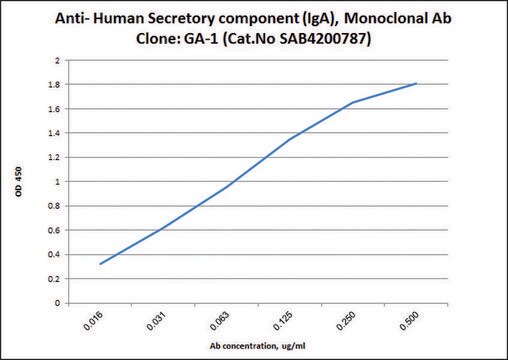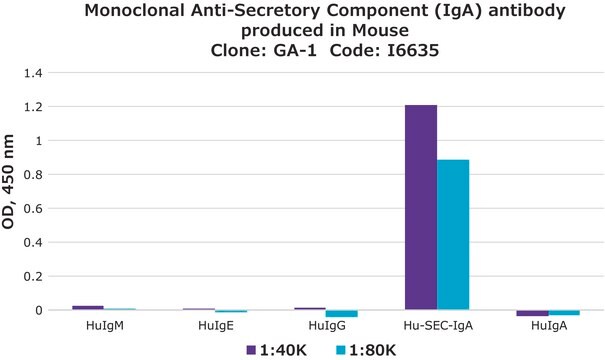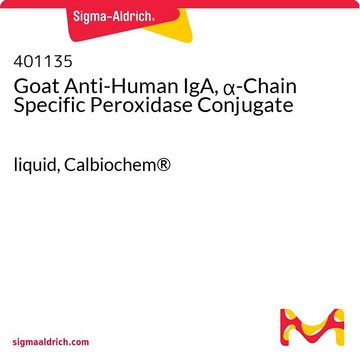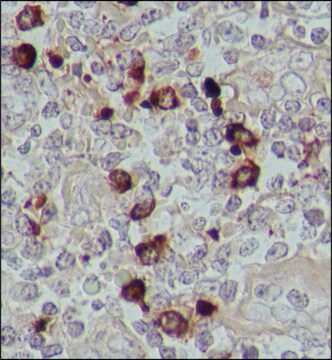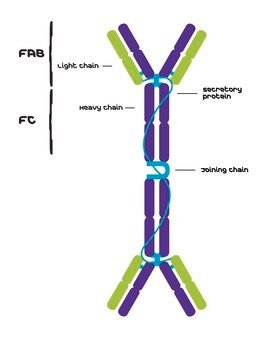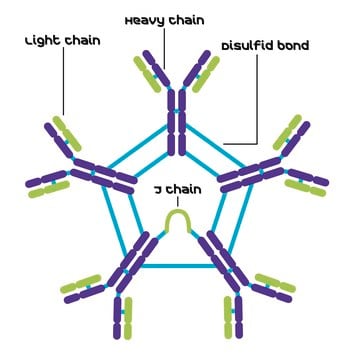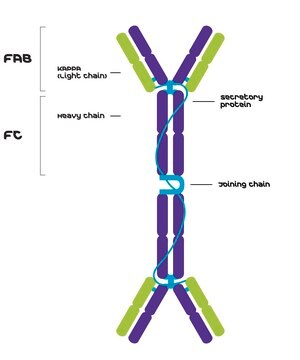MAC132
Mouse Anti-Human IgA, Secretory Antibody, Clone 4G10.1
clone 4G10.1, from mouse
Zaloguj sięWyświetlanie cen organizacyjnych i kontraktowych
About This Item
Kod UNSPSC:
12352203
eCl@ss:
32160702
NACRES:
NA.46
Polecane produkty
pochodzenie biologiczne
mouse
Poziom jakości
forma przeciwciała
purified immunoglobulin
rodzaj przeciwciała
secondary antibodies
klon
4G10.1, monoclonal
reaktywność gatunkowa
human (IgA)
metody
ELISA: suitable
izotyp
IgG1κ
Warunki transportu
wet ice
docelowa modyfikacja potranslacyjna
unmodified
Opis ogólny
The Mouse Anti-Human IgA antibody is an IgG monomeric immunoglobulin, built of two heavy chains and two light chains. Each molecule has two antigen binding sites. This is the most abundant immunoglobulin and is approximately equally distributed in blood and in tissue liquids, constituting 75% of serum immunoglobulins in humans. This is the only isotype that can pass through the human placenta, thereby providing protection to the fetus in its first weeks of life before its own immune system has developed. It can bind to many kinds of pathogens, for example viruses, bacteria, and fungi, and protects the body against them by complement activation (classic pathway), opsonization for phagocytosis and neutralisation of their toxins. There are 4 subclasses: IgG1 (66%), IgG2 (23%), IgG3 (7%) and IgG4 (4%). It is affinity-purified and demonstrated to react with Human IgA with minimal or no cross-reaction to Human IgG or Human IgM. The target of this antibody, Human IgA, constitutes 5-15 % of the serum immunoglobulins whereas dimeric IgA is localized to mucosa surfaces such as saliva, gastrointestinal secretion, bronchial fluids and milk. Mucosal IgA plays a major role in host defence by neutralising infectious agents at mucosal surfaces. The production is usually local and antigen specific IgA producing B-cells can be found in regions under the lamina propria where they mature into dimeric IgA producing plasma cells. IgA deficiency is the most common immunodeficiency that may affect both serum and mucosal produced IgA.
Specyficzność
Based on ELISA analysis, this antibody recognizes human IgA secretory subunit, with minimal or no cross-reaction human IgG or IgM.
Immunogen
Purified antibody corresponding to Human IgA, Secretory.
Zastosowanie
ELISA. Can be used as a capture antibody for ELISA at 10 μg/ml in PBS without carrier protein. Antibody should be titrated for optimal results in individual systems.
Research Category
Secondary & Control Antibodies
Secondary & Control Antibodies
Research Sub Category
Secondary Antibodies Adsorbed for Dual Labeling
Secondary Antibodies Adsorbed for Dual Labeling
This Mouse Anti-Human IgA, Secretory Antibody, Clone 4G10.1 is validated for use in Enzyme Immunoassay (ELISA) for the detection of Mouse Human IgA, Secretory.
Jakość
Evaluated by ELISA against Human IgA, Human IgG and Human IgM
Powiązanie
Replaces: 411423-400UG
Postać fizyczna
Format: Purified
Protein G Purified
Purified mouse monoclonal IgG1κ in buffer containing PBS without preservatives.
Przechowywanie i stabilność
Stable for 1 year at -20°C from date of receipt.
Inne uwagi
Concentration: Please refer to lot specific datasheet.
Oświadczenie o zrzeczeniu się odpowiedzialności
Unless otherwise stated in our catalog or other company documentation accompanying the product(s), our products are intended for research use only and are not to be used for any other purpose, which includes but is not limited to, unauthorized commercial uses, in vitro diagnostic uses, ex vivo or in vivo therapeutic uses or any type of consumption or application to humans or animals.
Ta strona może zawierać tekst przetłumaczony maszynowo.
Nie możesz znaleźć właściwego produktu?
Wypróbuj nasz Narzędzie selektora produktów.
Kod klasy składowania
12 - Non Combustible Liquids
Klasa zagrożenia wodnego (WGK)
WGK 2
Temperatura zapłonu (°F)
Not applicable
Temperatura zapłonu (°C)
Not applicable
Certyfikaty analizy (CoA)
Poszukaj Certyfikaty analizy (CoA), wpisując numer partii/serii produktów. Numery serii i partii można znaleźć na etykiecie produktu po słowach „seria” lub „partia”.
Masz już ten produkt?
Dokumenty związane z niedawno zakupionymi produktami zostały zamieszczone w Bibliotece dokumentów.
Nasz zespół naukowców ma doświadczenie we wszystkich obszarach badań, w tym w naukach przyrodniczych, materiałoznawstwie, syntezie chemicznej, chromatografii, analityce i wielu innych dziedzinach.
Skontaktuj się z zespołem ds. pomocy technicznej